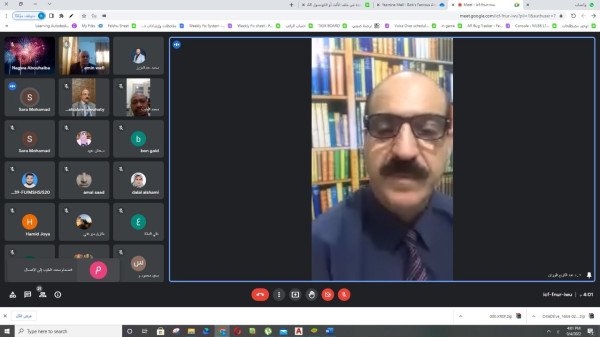Academics and media professionals call for monitoring women’s problems and providing solutions
Arab academics and media professionals have called on researchers to contribute scientifically to the international conference titled “Contemporary Women’s Issues in the Writings of Reformers: Challenges and Solutions” through substantial research addressing key challenges facing contemporary women and providing solutions to overcome these obstacles.
The call came during a virtual meeting held by the media committee of the “Contemporary Women’s Issues” conference on Thursday evening, chaired by Professor Dr. Abdel Karim Al-Wazzan, with the participation of Deputy Chairperson, Dr. Magda Mahmoud, and other committee members.
The international conference, organized by the Union of Afro-Asia Universities in collaboration with Mohammed V University in Rabat, the Union of Arab Women Leaders, and Aqua Group for Technology and Education, is scheduled to take place from November 25 to 26 in Istanbul.
Al-Wazzan urged academics and researchers to contribute scientific papers that highlight the significant challenges faced by contemporary women.
He also called on the media to participate in promoting the conference through various platforms, emphasizing the role of media in introducing the conference and its themes to a broad academic audience in the region.
Dr. Magda Mahmoud noted that her committee had completed preparations to provide various media services for the women’s conference and future conferences. She mentioned that the Egyptian TV channel would contribute to promoting scientific conferences and expressed readiness to host Union officials to discuss the upcoming conference on contemporary women’s issues.
Mahmoud also highlighted the committee’s plan to organize weekly sessions in collaboration with cultural and media institutions in the Arab world, including cultural forums with Dr. Zainab Al-Khafaji and the Reza Alwan Cultural Forum in Iraq.
Dr. Hamid Al-Shetari, Assistant Professor of Media at Dhi Qar University in Iraq, criticized the lack of foundational studies in the Arab world due to reliance on imported research methodologies that do not adequately address Arab issues. He emphasized the absence of foundational studies and the reliance on imported methodologies.
Dr. Zainab Al-Khafaji, Professor of Arabic Literature at Al-Mustansiriya University in Iraq, called for defining significant topics for research at the women’s conference and focusing on complex issues to find practical solutions.
Dr. Bisan Khalid Ali, Professor of Arabic Literature at the University of Baghdad, urged inviting well-known academic figures to contribute research using descriptive and experimental methods, ensuring the research is robust and addresses real problems.
Moroccan journalist Abdullah Al-Abadi, a member of the media committee, described the conference as an opportunity to honor prominent female figures who have contributed significantly to African and Asian societies, and to highlight women’s roles in humanitarian causes.
Dr. Badi’a Abdul Qader, Director of the Media Department at the Islamic University of Minnesota, called for innovative research methods and intensive media coverage of scientific conferences to ensure research findings reach decision-makers in the region.
Dr. Jihan Sabagh Ali, Assistant Professor at the College of Communication and Human Sciences at the Islamic University of Minnesota, agreed with Dr. Badi’a and stressed the need for accurate information about the Union’s senior members and participating researchers to enhance the quality of journalism.



